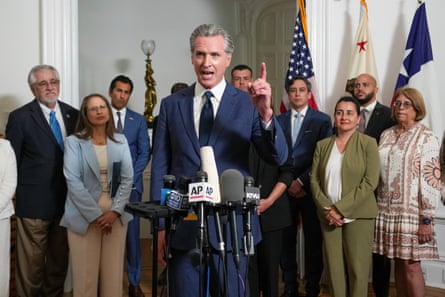The mid-decade redistricting war looming between Republicans and Democrats is exposing an idea that’s corroding American democracy – voters may not matter that much in determining who controls the US House.
After Texas Republicans unveiled a Donald Trump-fueled plan to pick up five additional US House seats last month, the California governor, Gavin Newsom, unveiled a plan on Thursday to throw out districts drawn by an independent commission and put in place new ones that would add five Democratic seats in response. Republicans are also expected to push ahead with plans to redraw maps in Ohio, Missouri, Florida and possibly Indiana, in their favor.
Each of those machinations could be enormously consequential in next year’s midterm elections because Republicans only hold a three-seat majority in the US House of Representatives. Republicans hold the power to redraw more districts in their favor in a redistricting war.
“Gerrymandering is bad enough once a decade,” said Richard Pildes, a law professor at New York University. “But if we open the door to continual efforts throughout the decade to squeeze out every additional seat based on changing calculations to the parties, it’s very bad for voters who have enough trouble developing connections with their representatives and it’s very bad for democracy more generally because it promotes cynicism about the process.”
While technological advances have made extreme partisan gerrymandering the norm for decades, rejiggering the lines in the middle of a decade is “taking it to the next level”, said Lee Drutman, a senior fellow in the political reform program at the New America thinktank.
“It makes elections seem pretty secondary to the machinations of legislators and courts, which is probably not the best for democratic legitimacy,” said Drutman, who supports democratic reforms such as proportional representation and multi-member House districts. “It continues to undermine the idea that elections have any meaning.”
The US constitution requires lawmakers to redistrict at least once every 10 years, and if lawmakers gerrymander, they face the challenge of ensuring that their map can endure across an entire decade. That allows for a sliver of competition – even if gerrymandered districts lock in a partisan advantage at the beginning of a decade, shifting demographics and political trends might make a district more competitive over time.
Mid-decade redistricting takes that off the table.
“It presumably increases the potency for gerrymandering because you can do the gerrymandering based on very recent data and the map doesn’t have to endure for as long,” said Nicholas Stephanopoulos, an election law professor at Harvard. “The worst case isn’t just a one-off mid-decade re-redistricting it’s a continuous re-redistricting. Before every election, you check out which of your side’s incumbents had a closer call than you wanted last time and you make their district three or five or seven points more Democratic or Republican.”
In recent years, Democrats have pushed to end extreme partisan gerrymandering, advancing efforts that require lawmakers to abide by certain fairness requirements when they draw district lines or give mapmaking power to independent commissions. The sweeping voting rights legislation that failed in the US Senate during the Biden administration would have required independent redistricting commissions in every state.

But even the most ardent champions of those reforms have called for Democrats to counter Republican-led gerrymandering with their own, coming around to the idea that while long-term reform is still a worthwhile goal, the immediate danger is too grave. “We’re doing something now that is responsive to what is going on with this White House,” the former US attorney general Eric Holder, who now leads the National Democratic Redistricting Committee, said during a Sunday interview on Meet the Press.
Common Cause, a watchdog group that has been one of the most prominent advocates for gerrymandering reform, announced on Tuesday that it would not stand in the way of retaliatory gerrymanders as long as they met certain fairness criteria.
Others have been more critical. “If the only way to protect democracy is to undermine it – what exactly are you protecting?” Chuck Todd, the former host of NBC’s Meet the Press wrote in his newsletter this month. Alex Lee, a Democrat in the California state assembly, offered a similar argument on X last month. “Fundamentally gerrymandering UNDERMINES democracy. The right answer is to abolish politicians picking their own voters & drawing maps nationally for good. It is dangerous to kick off a race to the bottom w/ gerrymandering.”
Stephanopoulos said the current congressional map was essentially balanced between Democrats and Republicans in the aggregate. “I’d rather have fair maps in every state aggregate into a fair US House. If we can’t get that because the Congress won’t require fair maps and neither will the supreme court, then the worst case, I think, is one side gerrymanders and the other side doesn’t, and we get a highly distorted US House.
“That then means that the majority of Americans aren’t represented by a majority of legislators, and Congress passes laws that don’t reflect what the majority of Americans want and so offsetting gerrymanders at least prevents that worst-case outcome.”
The mid-decade redistricting battle may also only exacerbate another escalating problem in US politics – reducing competition in the US House districts, which has been steadily decreasing. Only 27 out of 435 districts – roughly 6% – were considered competitive in the 2024 midterms. Had the proposed map in Texas been in place during the 2024 elections, neither Donald Trump nor Kamala Harris would have carried a district by less than 10 points (Trump would have carried 30 and Harris eight).
“Ultimately it’s not a sustainable solution for anybody. It’s a mockery of democracy,” Drutman said. “At some point I think people have to realize there are better ways to do elections.”

 3 months ago
155
3 months ago
155








 English (US) ·
English (US) ·